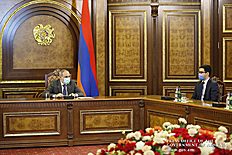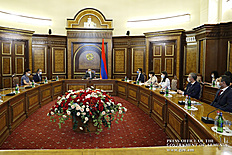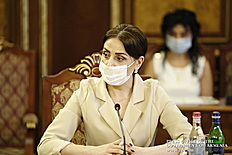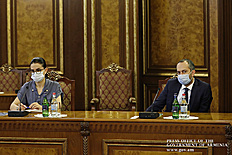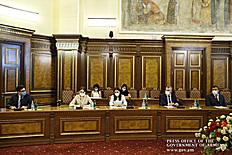Press releases
PM: “Corruption must either be eradicated, or it should be minimized in Armenia, so that it never again reappears on our public agenda”
more 2 photos
Prime Minister Nikol Pashinyan today met with the Corruption Prevention Commission’s members, led by Haykuhi Harutyunyan. Minister of Justice Rustam Badasyan was in attendance.
Greeting the members of the commission, the Prime Minister said:
“Dear colleagues, I am pleased to meet you today. Less than a year ago a commission for prevention of corruption was formed in Armenia, which is of conceptual importance to our country, since we all know that the program of the Armenian government enshrines the vision of a corruption-free society.
Today the fight against corruption is central on Armenia’s domestic agenda, but strategically we should strive to develop clear-cut mechanisms to prevent corruption, bearing in mind that corruption must either be eradicated, or it should be minimized in Armenia, so that it never again reappears on our public agenda. Of course, we need effective mechanisms to ensure that no corruption case goes undisclosed in our country.
The purpose of our meeting is to discuss and understand how well the commission is doing and which way the government can assist the commission in its proceedings, considering that the government has specific commitments in terms of ensuring your normal activities. I hope we will be able to meet the goals specified in our anticorruption strategy within the shortest deadlines. In fact, this strategic paper is the manifest of our joint action. Today, we will see where we have arrived in terms of implementing the strategy, which affects the Commission for Prevention of Corruption.”
Thankful for the reception, Haykuhi Harutyunyan first introduced commission members Lilit Aleksanyan, Aramayis Pashinyan, Narek Hambardzumyan and gave details of their individual functions. She noted that the commission has been fully operational for more than 8 months ever since its formation. As a state institution, the commission has been involved in the system of civil service; new working standards and internal regulations have been developed.
A system of declaration of interests has been introduced. The system’s terms of reference were streamlined mediating artificial intelligence-supported solutions. It will allow the commission to automatically collect, analyze data and minimize the impact of human factors, which in turn will help improve the commission’s overall performance. Recommendations have been formulated with a view to establishing institutional mechanisms for confiscation of ill-earned assets and property, which will be submitted to the Ministry of Justice.
Ethics-related inspections have been carried out within the judiciary. This process shall be continued. The commission will come up with new proposals concerning the expansion of the ethics system and its application in the public administration system. Recommendations are being drafted on legislative amendments.
Views were exchanged on the government’s anticorruption agenda. The Prime Minister stressed the need to build up an institutional framework for the aforesaid declaration system. He called for closer cooperation between the commission and the law enforcement system, the use of electronic systems, legislative reforms and other key issues. Several practicalities related to the prevention of corruption, detection of corruption crimes, anticorruption education and raising the public’s awareness were discussed during the meeting.
“No one questions the government’s political will to succeed in the fight against corruption and prevent corruption. Therefore, we must set the highest benchmark and continue our efforts in this direction,” Nikol Pashinyan concluded.
